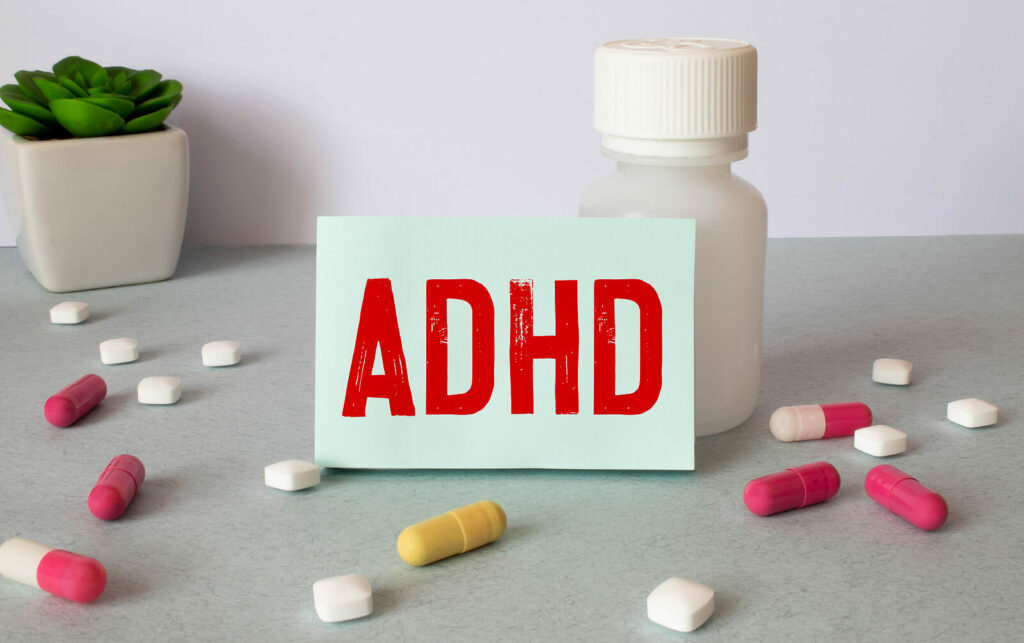Managing ADHD With Medication
Medication Is An Optional Treatment For ADHD
Medication is one of the three major treatment options for ADHD, along with ADHD-Focused Therapy and Neurofeedback for ADHD. Ritalin. Adderall. Vyvanse. Concerta. The amount of ADHD medications on the market today can be overwhelming, which can make finding the right one feels impossible. While we do not offer Psychiatric services at the ATTN Center, we do work closely with many Psychiatrists throughout NYC who specialize in ADHD.
Their job is to find you the right type of ADHD medication, and the correct dosage amount for your symptoms. This can be an arduous and time-consuming process, which causes many patients to give up because they can’t find the right medication cocktail, or because the side effects are too bothersome. Here, we are going to discuss the pros and cons of Medication for ADHD, from the point of view of ADHD specialists who do not prescribe and rarely recommend medication to treat ADHD (except for severe circumstances).
Medication Is Not A Cure For ADHD

Medication is not a cure for ADHD. It’s more like a band-aid that reduces symptoms temporarily but does not fix them. ADHD is a wiring issue in the brain, and medication is a group of chemicals that affects the wiring but doesn’t work to repair it. But even though it doesn’t cure ADHD, it can be a useful tool in certain extreme circumstances to reduce severe inattention, hyperactivity, impulsivity, and emotional regulation.
ADHD As A Co-Occurring Condition
When ADHD coexists with other conditions such as anxiety, depression, or bipolar disorder, other kinds of medications may be prescribed, such as antidepressants or antipsychotics. Your healthcare provider can help you select the right medication and dosage for your unique needs. Working with your provider to monitor your treatment is important in managing the side effects that you may experience. Research shows that combining medication with behavioral interventions such as parent education training, behavioral therapy, and school accommodations will provide the greatest likelihood of success in treating ADHD.
Which ADHD Medication Is The Best For Me?
The number of medications available to treat ADHD can be overwhelming. The process of selecting the best ADHD medication for you or your child, or deciding to medicate at all, is incredibly personal. The ADHD medications prescribed to both children and adults are broadly categorized as
- Stimulants: Considered the first-line treatment for ADHD. Amphetamines fall under this category, along with methylphenidate, the most widely used treatment for ADHD, and their derivatives.
- Non-stimulants: Prescribed to patients who don’t tolerate or see benefits from stimulant medications. Three non-stimulants are approved to treat ADHD: atomoxetine, guanfacine, and clonidine. Non-stimulants may also be prescribed for use alongside stimulants to treat symptoms that the latter does not alleviate.
Selecting the “best” ADHD medication can be a lengthy trial-and-error process of dosage and timing that is often related to a patient’s history, genetics, experienced side effects, and unique metabolism.
The most popular ADHD medications:
(in alphabetical order)

- Adderall (amphetamine)
- Concerta (methylphenidate)
- Dexedrine (amphetamine)
- Focalin (dexmethylphenidate)
- Ritalin (methylphenidate)
- Strattera (atomoxetine hydrochloride)
- Vyvanse (lisdexamfetamine dimesylate)
For a complete list of ADHD medications, scroll down to the bottom of this page.
How Do Stimulant Medications Treat ADHD?
ADHD is a neurological disorder, resulting from the deficiency of a neurotransmitter, or a group of neurotransmitters, in specific areas of the brain. This is what we mean when we say that ADHD affects the “wiring” of the brain. Neurotransmitters are chemicals that transmit signals between nerve cells by bridging the gap between them. One key neurotransmitter often deficient in individuals with ADHD is norepinephrine, along with its building blocks, dopa, and dopamine. In theory, the primary stimulant medications used to treat ADHD stimulate specific cells within the brain to produce more of this deficient neurotransmitter. That’s why these medications are called stimulants… though it’s unknown exactly how they work to relieve ADHD symptoms.
What Are The Side Effects Of ADHD Medication?
Unfortunately, not many medical studies have looked at the long-term effects of ADHD medications. The little research we have points to ADHD medication being adequately effective at best. An Australian study published in 2010 found no significant improvement in behavior and attention problems in children between the ages of 5 and 14 years old who took medication for their ADHD. Their self-perception and social functioning didn’t improve either. Instead, the medicated group tended to have higher levels of diastolic blood pressure. They also had slightly lower self-esteem than the non-medicated group and performed below age level.
This is not necessarily the typical experience for children, but by no means is ADHD medication among the most effective pharmaceutical drugs.
Side-Effects of ADHD Stimulant Medications:

- Increased blood pressure
- Decreased appetite
- Stomach aches
- Moodiness and irritability
- Sleep problems
- Headaches
- Weight loss
- Dizziness
Side-Effects of ADHD non-Stimulant Medications:
- Drowsiness
- Fatigue
- Irritability
- Insomnia
- Nightmares
- Dry mouth
- Stomach aches
- Decreased appetite
- Nausea
- Headaches
It is very common for patients to experience side effects when trying and adjusting stimulant medications. Prescribers may start with small doses and increase dosing if the patient does not see benefits and if side effects are tolerable. Many side effects are also temporary until the patient adjusts to the new medication. Over time, psychiatrists aim to reduce doses of ADHD medication to achieve maximum benefit with tolerable side effects.
In conclusion, while ADHD medication is recommended for severe cases, people with mild and moderate ADHD symptoms are encouraged to try other tools for managing ADHD without medication. Click here to learn more about the ATTN Center’s 5 Tips for Managing ADHD without medication.
ADHD Medications List: Stimulants
Methylphenidate
- Generic: tablet; immediate release; lasts about four hours; comes in 5, 10, 15 mg dosages
- Adhansia XR: brand name; capsule; extended-release; lasts about 16 hours; comes in 25 mg, 35 mg, 45 mg, 55 mg, 70 mg, and 85 mg dosages
- Aptensio XR: brand name; capsule; immediate and extended release; lasts 12 hours; comes in 10, 15, 20, 25, 30, 40, 50, and 60mg dosages
- Concerta: brand name; tablet; lasts about 12 hours; comes in 18, 27, 36, 54 mg dosages
- Cotempla XR-ODT: brand name; extended-release orally disintegrating table; comes in 8.6mg, 17.3mg, and 25.9mg
- Daytrana: brand name; skin patch; lasts about eight hours; comes in 10, 15, 20, 30 mg
- Jornay PM: brand name; delayed release extended release capsule; comes in 20mg, 40mg, 60mg, 80mg, and 100mg
- Metadate CD: brand name; capsule; lasts eight hours; comes in 10, 20, 30, 40, 50, 60 mg dosages
- Metadate ER: brand name; tablet; lasts eight hours; comes in 10, 20 mg dosages
- Methylin: brand name; liquid and chewable tablets; immediate release; lasts four hours; tablets come in 2.5, 5, 10 mg dosages, liquid in 5 mg/tsp and 10mg/tsp dosages
- QuilliChew ER: brand name; chewable tablet; extended-release; lasts eight hours; comes in 20, 30, and 40 mg dosages
- Quillivant XR: brand name; liquid; extended-release; lasts 12 hours; dosages range from 20 to 60 mg
- Ritalin: brand name; tablet; immediate release; lasts about four hours; comes in 5, 10, 15 mg dosages
- Ritalin LA: brand name; capsule; lasts about eight hours; comes in 10, 20, 30, and 40 mg dosages
- Ritalin SR: brand name; tablet; lasts about eight hours; comes in 20 mg dosage
Dextro-Methylphenidate
- Focalin: brand name; tablet; lasts four hours; immediate release; comes in 2.5, 5, 10 mg dosages
- Focalin XR: brand name; capsule; lasts eight hours; immediate release followed by second delayed release; comes in 5, 10, 15, 20, 30, 40 mg dosages
Dextro-Amphetamine
- Adderall: brand name; tablet; immediate release; lasts four hours; comes in 5, 7.5, 10, 12.5, 15, 20, 30 mg dosages
- Adderall XR: brand name; capsule; immediate and delayed release; lasts eight hours; comes in 5, 10, 15, 20, 25, 30 mg dosages
- Adzenys ER: brand name; extended-release oral suspension; 1.25 mg/ml
- Adzenys XR-ODT: brand name; orally-disintegrating tablet; immediate and delayed release; lasts up to 12 hours; comes in 3.1 mg, 6.3 mg, 9.4 mg, 12.5 mg, 15.7 mg, and 18.8 mg dosages
- Dexedrine Spansule: brand name; capsule; immediate release followed by gradual release; lasts eight hours; comes in 5, 10, 15 mg dosages
- Dyanavel XR: brand name; liquid; extended-release; lasts 13 hours; dosages range from 2.5 mg to 10 mg per day
- Evekeo: brand name; tablet; immediate release; lasts four fours; comes in 5 and 10 mg dosages
- Generic; tablet; immediate release; lasts four hours; comes in 5, 10 mg dosages
- Mydayis: brand name; long-acting capsule; comes in 12.5mg, 25mg, 37.5 mg, and 50mg dosages
- ProCentra: brand name; liquid; immediate release; lasts four hours; comes in 5 mg/tsp dosage
- Vyvanse: brand name; capsule and chewable tablet; lasts 10 to 12 hours; comes in 20, 30, 40, 50, 60, 70 mg dosages
- Zenzedi: brand name; immediate release tablet; 2.5mg, 5mg, 7.5mg, 10mg, 15mg, 20mg, and 30mg
ADHD Medications List: Nonstimulants
Atomoxetine
- Strattera: brand name; capsule; long acting; 24-hour duration; 10 mg, 18 mg, 25 mg, 40 mg, 60 mg, 80 mg, 100 mg
Clonidine
- Kapvay: brand name; extended release tablets; 24-hour duration; 0.1mg and 0.2 mg
Guanfacine
- Intuniv: brand name; extended-release tablets 1mg, 2mg, 3mg, 4mg; 24-hour duration
Qelbree
- Qelbree: (active ingredient, viloxazine hydrochloride) 100mg or 200mg once daily.
Start Managing ADHD in NYC
Managing your ADHD at the ATTN Center is unique. We offer traditional therapy practices to address the psychological and emotional impacts of having ADHD in the real world. We offer Neurodivergent individuals practical support for organization and structure.
Our practice understands the unique challenges of having ADHD that other therapies do not. Our expert ADHD-Focused therapists look forward to speaking with you. Contact us today.
- Learn more about our team and the services offered here!
- Reach out to us through our convenient online therapy contact page here!
- Begin the journey to understanding and managing your diagnosis and living your best life!
Other ADHD Services Offered By The ATTN Center in NYC
We not only offer ADHD therapy, but also other services related to the treatment of ADHD and its side effects. This includes ADHD-Focused therapy, neurofeedback, and ADHD testing options. At ATTN Center of NYC, we do everything in our power to treat ADHD without the use of medication. However, we understand in some severe cases additional measures may be needed. Due to this, we also maintain close relationships with many of NYC’s best psychiatrists.